Building boom all over bar the grouting? Pete Wargent
An unusual looking Building Approvals data release from the ABS, which showed a seasonally adjusted 2.1% increase in monthly approvals to 18,900 (21.4% year-on-year) but the trend result declining by 1.8% for the month to 18,309 (to be up by just 6.8% year-on-year).
The trend result led to various reports of the building boom being over. Confusing? It certainly was, with the trend result evidently applying negative "tail weights" to the strong run of monthly approvals at the beginning of the year.
Ultimately monthly building approvals figures will always and forever be lumpy, and the trend weights arguably add limited value here.
Below I have instead charted the original unadjusted data by month for houses and other dwellings - no seasonal adjustments and no trend weights, just a moving average whacked through the middle - so you can make your own mind up.
So, have building approvals peaked or not? In short, detached house approvals have probably peaked for the cycle. On the other hand townhouses, units and apartments may not quite yet have peaked, but given tighter lending criteria being applied for investors and waning rental yields, the peak of the cycle appears likely to be imminent.
Below I have instead charted the original unadjusted data by month for houses and other dwellings - no seasonal adjustments and no trend weights, just a moving average whacked through the middle - so you can make your own mind up.
So, have building approvals peaked or not? In short, detached house approvals have probably peaked for the cycle. On the other hand townhouses, units and apartments may not quite yet have peaked, but given tighter lending criteria being applied for investors and waning rental yields, the peak of the cycle appears likely to be imminent.

The rolling annual data shows that over the year to September a record total of 230,296 dwellings was approved, with some 114,218 of them being attached dwellings, which is also a record.
Incredibly, the annual total number of attached dwelling approvals is approaching the number of houses approved, something that nobody was predicting three years ago.
Incredibly, the annual total number of attached dwelling approvals is approaching the number of houses approved, something that nobody was predicting three years ago.
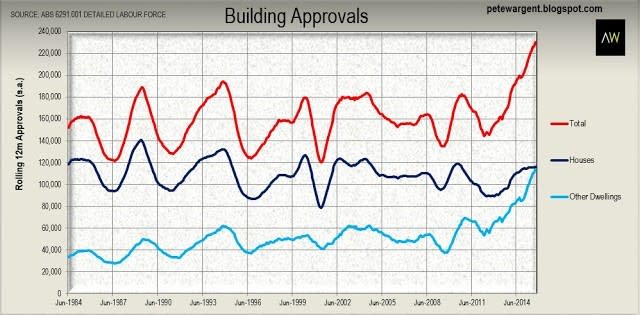
Indeed some folk predicted there would be no material increase in approvals period, which just goes to show how unpredictable cycles can be at times.
House approvals continue to trend up steadily in Sydney and Melbourne, but are flatlining in Brisbane, and are now trending down in Perth, Adelaide and Canberra.

Over the past 12 months Sydney has seen four big months for attached dwellings approvals ranging from 3,111 in May to a record 4,260 in July, but approvals tailed away again in September to just 1,835.
Melbourne waved through another 2,842 units in September for a fresh rolling annual high of 34,726 approvals.
Meanwhile Brisbane had another whopping month of high rise approvals, also sending its annual unit approvals to a new high of 18,301. This figure is up from an equivalent total of just 5,412 three years ago - again, think back to the commentary at the time, did anyone predict this surge in approvals or Chinese capital?
The Brisbane Central Business District is set to "benefit" from new high rise towers which will nudge against the city's 274 metre height limit, a restriction set for aviation regulations.
Meanwhile Brisbane had another whopping month of high rise approvals, also sending its annual unit approvals to a new high of 18,301. This figure is up from an equivalent total of just 5,412 three years ago - again, think back to the commentary at the time, did anyone predict this surge in approvals or Chinese capital?
The Brisbane Central Business District is set to "benefit" from new high rise towers which will nudge against the city's 274 metre height limit, a restriction set for aviation regulations.
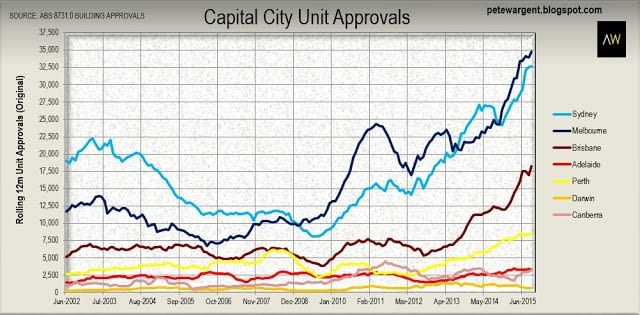
What more is there to say on this point that I haven't already said over the past two years?
whether or not all of these apartments are built, steer clear of the obvious areas of oversupply in Melbourne and Brisbane in particular, and be even more wary than usual about buying expensive off-the-plan or new build units.
whether or not all of these apartments are built, steer clear of the obvious areas of oversupply in Melbourne and Brisbane in particular, and be even more wary than usual about buying expensive off-the-plan or new build units.
High rise gluts power on
In particular, the number of high rise (4+ storey) units being approved continues to defy common sense in Victoria...
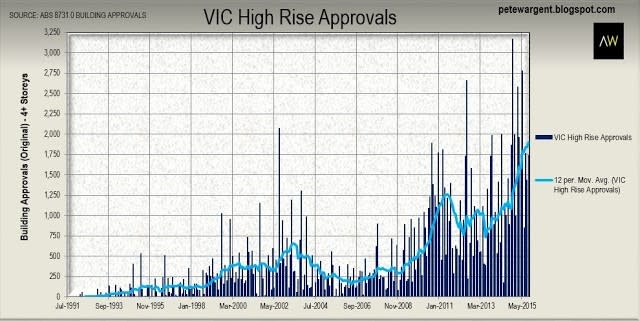
...and in Queensland, which saw its greatest ever month for high rise apartment approvals in September. The ratio of new stock to existing stock in a number of Brisbane's inner suburbs is exceptionally high, as documented here previously.
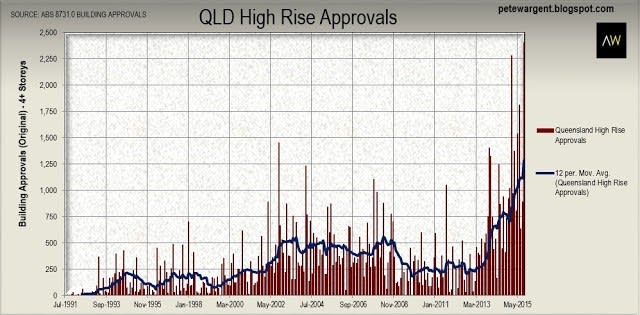
Meanwhile, New South Wales may have passed its cyclical peak in respect of high rise approvals, although due to necessity crowded Sydney will continue to approve more of this dwelling type in future. Nevertheless the higher-density sector is one I'd mark down to "underperform".
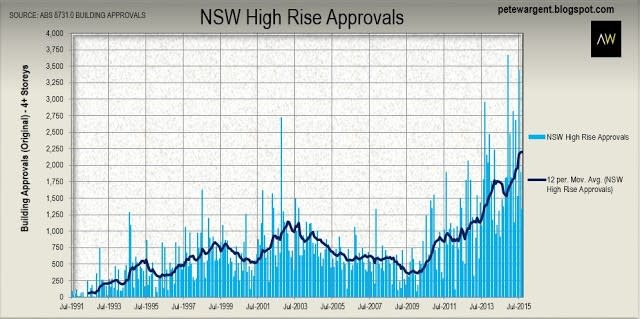
The wrap
Overall, despite talk of the building boom being "at an end" thanks to the prplexing ABS trend data, this was a reasonably strong headline result for building approvals, though once again skewed towards high-density projects.
With the macroprudential screw tightening it seems increasingly likely that unit approvals could soon drop off too, and a significant percentage of approved developments may never make it through to the completion stage.
Accordingly the dwelling starts data series will be one to watch closely. Note that there can be a significant lag between approval and completion for multi-unit developments, perhaps up to several years.
PETE WARGENT is the co-founder of AllenWargent property buyers (London, Sydney) and a best-selling author and blogger.
His latest book is Four Green Houses and a Red Hotel.
Pete Wargent
Pete Wargent is the co-founder of BuyersBuyers.com.au, offering affordable homebuying assistance to all Australians, and a best-selling author and blogger.
